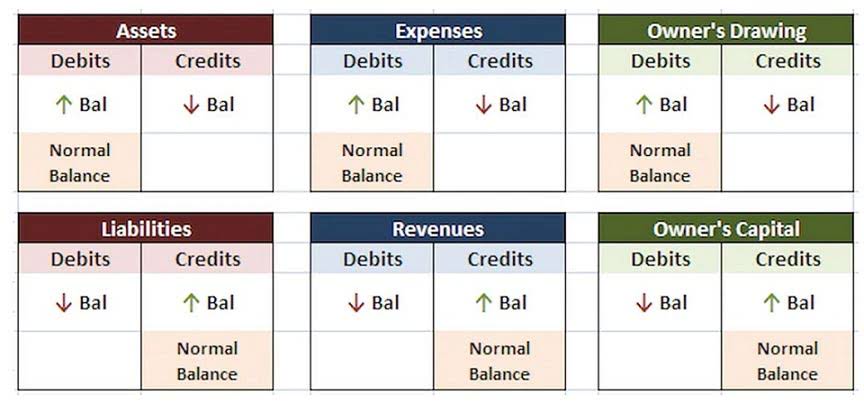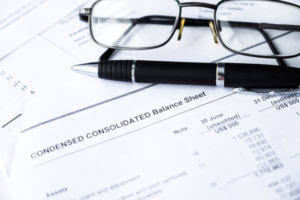
Credit risk reflects the potential that a ledger account borrower will default on a loan or lease, causing the bank to lose potential interest earned and the principal loaned to the borrower. Working with an adviser may come with potential downsides, such as payment of fees (which will reduce returns). There are no guarantees that working with an adviser will yield positive returns. The existence of a fiduciary duty does not prevent the rise of potential conflicts of interest. This also includes goods that are still works in progress and any raw materials that the company has for producing goods. There are a few common components that investors are likely to come across.
- Last, a balance sheet is subject to several areas of professional judgement that may materially impact the report.
- On February 28 prepaid expenses will report $900 (3 months of the insurance cost that is unexpired/still prepaid X $300 per month), and so on.
- The general guidelines and principles, standards and detailed rules, plus industry practices that exist for financial reporting.
- Non-current assets can also be intangible assets, such as goodwill, patents, or copyrights.
- This is an important number to investors because you can see the company’s worth.
- However, this is mainly because a large current portion of long-term debt is due, likely thanks to a balloon payment.
Tangible Fixed Assets (Property, Plant, and Equipment – PP&E)
This metric gives a more comprehensive snapshot of a company’s overall financial health, balancing both long-term and short-term obligations. Efficient management of current assets ensures a company has enough liquidity to cover immediate expenses and avoid cash flow issues. It’s important to note that while current assets provide liquidity, non-current assets (like buildings or machinery) contribute to the company’s long-term operational strength. Balance sheets are typically prepared at the end of an accounting period, such as a quarter or a fiscal year. They provide a comprehensive overview of the company’s financial health, liquidity, and its ability to meet short-term and long-term obligations. Sometimes liabilities (and stockholders’ equity) are also thought of as sources of a corporation’s assets.
Why is the Debt-to-Equity Ratio important?
Many companies operate on a fiscal year instead, which means they pick a 12-month period that more accurately reflects their business cycles. Now, let’s explore some examples to illustrate how “in millions” is used on balance sheets. My seemingly dumb business administration 102 professor has made what I think is a huge error on grading my last midterm, my question is as follows. On a balance sheet that is stated in terms of millions there is the number $74,000 (according to her) that number is equal to 74,000,000 dollars.

Current Ratio

Liabilities on the other hand could include pending environmental lawsuits or fines, which typically occur when a company fails to meet its environmental obligations. These could adversely impact a company’s reputation, and consequently might affect their ability to attract ethical shareholders and customers. Assets can include investments the company has made in pursuit of environmental sustainability – like renewable energy sources, energy-efficient machinery and infrastructure for reducing carbon footprint. Currently, there exist very few protections or pathways to appeal for affected parties – those covered by the mandate are simply expected to comply – regardless of cost or economic impact to the operation. Moreover, such new regulations often become pathway to financial success for litigators eager to serve as the enforcers of new government-enacted mandates.
- Non-current assets include the items of fixed assets like property plant & equipment (PPE).
- Long-term liabilities are liabilities that the company is not obligated to pay in the short term.
- Shareholder equity is not directly related to a company’s market capitalization.
- The balance sheet, for example, is called the Statement of Financial Position in IFRS-compliant accounts.
- Stock markets are volatile and can fluctuate significantly in response to company, industry, political, regulatory, market, or economic developments.
- Operating activities link the company’s net income to its cash flow from operations.

An unfunded mandate is perhaps best described as a government imposed requirement, restriction or regulation which results in additional direct or indirect costs for the employer or taxpayer. As example, recent government legislation governing waste water discharge requirements has placed heavy burdens on many local municipal utilities and hence local taxpayers. The scope and range of such legislation ranges from healthcare mandates, what does in millions mean on a balance sheet to air pollutions limitations, to automobile mileage requirements. In virtually every instance, the consequence of unfunded mandates is the imposition of new costs which must either be absorbed by the operator, or passed on to the consumer or taxpayer. Unfunded Liabilities represent a distinct and separate class of liabilities. Among other things, they are not generally included in our governments’ calculations of overall debt.
- A balance sheet is a financial statement that provides a snapshot of a company’s financial position at a specific point in time.
- There may also be retained earnings (profit reinvested back into the company instead of paid out to shareholders), which might be devoted to funding sustainable practices.
- The amount of other comprehensive income is added/subtracted from the balance in the stockholders’ equity account Accumulated Other Comprehensive Income.
- We focus on financial statement reporting and do not discuss how that differs from income tax reporting.
- Current assets are things that the company can convert into cash within one year.

YouFibre Limited, a company that provides ultra-fast fibre broadband services, reported net current liabilities of £4,420,979 as of 31 December 2023. This figure indicates that the company’s current liabilities exceeded its current assets. This metric provides insight into how much value a company holds after covering its short-term liabilities but before considering long-term obligations. It helps stakeholders understand whether the company has sufficient resources to continue operating in the medium-to-long term without depleting its assets.
Meanwhile, Investors Title Company, one of the first small companies I could find on short notice that follows such a practice, doesn’t abbreviate its income statement Bookkeeping for Consultants at all. Most economists agree that a normal Federal Reserve balance sheet is significantly smaller than $4.5 trillion. There’s no specific right amount, but for context, remember that the balance sheet was less than $1 trillion before the crisis began. The net of the asset and its related contra asset account is referred to as the asset’s book value or carrying value. A visual aid used by accountants to illustrate a journal entry’s effect on the general ledger accounts. Debit amounts are entered on the left side of the “T” and credit amounts are entered on the right side.
- ###Efficiency RatiosEfficiency ratios like the inventory turnover ratio helps analyze how well a company is managing its assets and liabilities internally.
- The book value of an asset is also referred to as the carrying value of the asset.
- Phrases like ‘qualified opinion’ or ‘emphasis of matter’ may suggest there’s a problem.
- The sales revenue could still be on credit or perhaps it’s a bad debt expense (money that the company cannot collect from a customer for some reason).
- Using debt (such as loans and bonds) to acquire more assets than would be possible by using only owners’ funds.
For tax purposes, you will need to enter your business’s expenses in the Income Statement section of the ITR14. The expense list required here is not quite as detailed as the Income Statement template we have provided. A bank generates income when the interest it earns from loans exceeds the interest paid on deposits. In the U.S., banks are regulated by multiple agencies, including the Federal Deposit Insurance Corporation (FDIC).